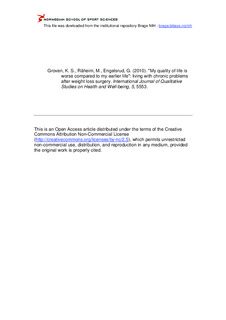| dc.contributor.author | Groven, Karen Synne | |
| dc.contributor.author | Råheim, Målfrid | |
| dc.contributor.author | Engelsrud, Gunn | |
| dc.date.accessioned | 2011-01-12T09:50:23Z | |
| dc.date.available | 2011-01-12T09:50:23Z | |
| dc.date.issued | 2010-11-18 | |
| dc.identifier | Seksjon for kroppsøving og pedagogikk / Department of Physical Education | |
| dc.identifier.citation | International Journal of Qualitative Studies on Health and Well-being. 2010, 5(4), 5553 | en_US |
| dc.identifier.issn | 1748-2623 | |
| dc.identifier.uri | http://hdl.handle.net/11250/170659 | |
| dc.description | This journal is published under the terms of the Creative Commons Attribution-Noncommercial 3.0 Unported License. | en_US |
| dc.description.abstract | Weight loss surgery is commonly regarded as improving individuals’ health and social life, and resulting in a happier and more active life for those defined as ‘‘morbidly obese.’’ However, some researchers have started to doubt whether these positive outcomes apply to everyone and this article explores this doubt further. More specifically, we focus on the experiences of women whose life situation became worse after weight loss surgery. The material draws on qualitative interviews of five Norwegian women undergoing the irreversible gastric bypass procedure. Our findings illustrate that the women lived seemingly ‘‘normal’’ lives prior to the surgery with few signs of illness. Worries about future illness as well as social stigma because of their body shape motivated them to undergo weight loss surgery. After the surgery, however, their situation was profoundly changed and their lives were dramatically restricted. Chronic pain, loss of energy, as well as feelings of shame and failure for having these problems not only limited their social lives but it also made them less physically active. In addition, they had difficulties taking care of their children, and functioning satisfactorily at work. Accordingly, the women gradually felt more ‘‘disabled,’’ regarding themselves as ‘‘outsiders’’ whose problems needed to be kept private. The results highlight some ‘‘subtle’’ consequences of weight loss surgery, particularly the shame and stigma experienced by those whose lives became dramatically worse. Living in a society where negative impacts of weight loss surgery are more or less neglected in research as well as in the public debate the women seemed to suffer in silence. Their problems were clearly present and felt in the body but not talked about and shared with others. | en_US |
| dc.language.iso | eng | en_US |
| dc.publisher | Taylor&Francis | en_US |
| dc.subject | obesity | en_US |
| dc.subject | weight loss surgery | en_US |
| dc.subject | women | en_US |
| dc.subject | chronic illness | en_US |
| dc.subject | health | en_US |
| dc.title | ‘‘My quality of life is worse compared to my earlier life’’: living with chronic problems after weight loss surgery | en_US |
| dc.type | Journal article | en_US |
| dc.type | Peer reviewed | en_US |
| dc.subject.nsi | VDP::Medical disciplines: 700::Health sciences: 800 | en_US |
| dc.source.pagenumber | 5553 | en_US |
